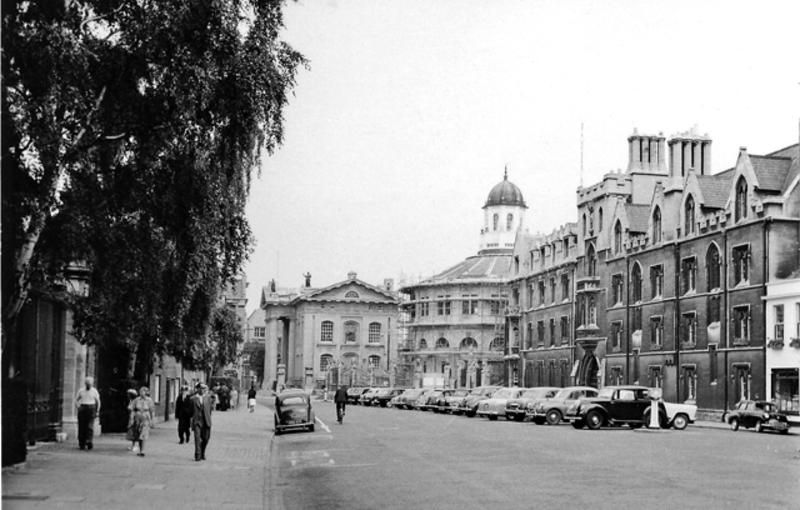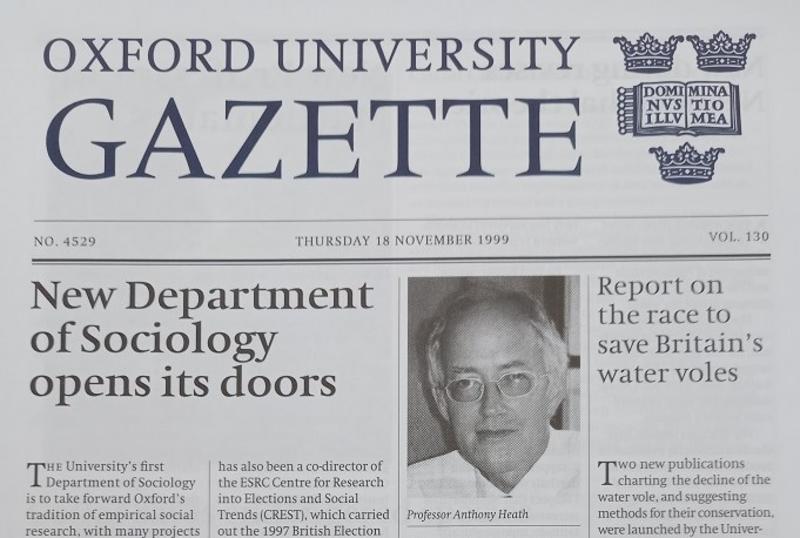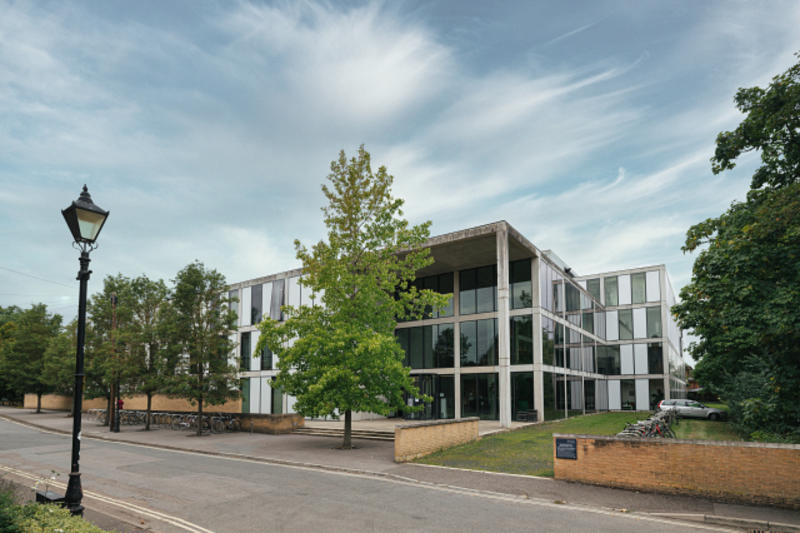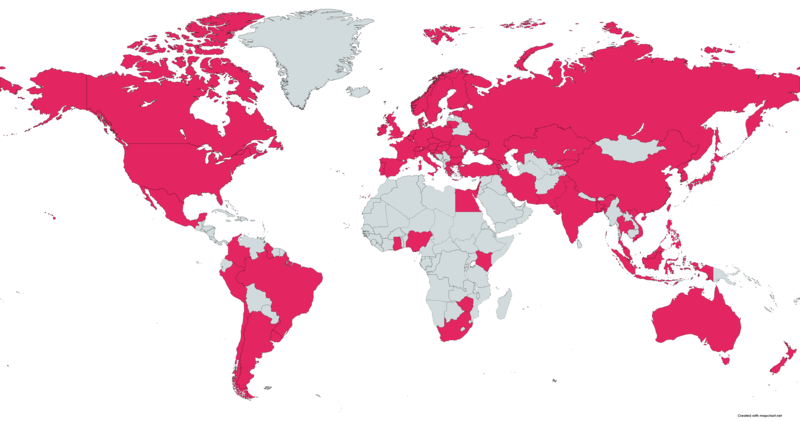A history of the Department
A brief history of the Department of Sociology

The origins of Oxford Sociology
Despite the Department’s relative youthfulness, the subject of sociology has a rich history at Oxford, with sociologists present at the University since the early 20th century.
A particularly influential figure in the early development of Oxford Sociology was political theorist and economist G. D. H. Cole, who in 1944 became the first Chichele Professor of Social and Political Theory. Cole had previously helped politician William Beveridge on his pivotal report that laid the foundations for the British post-war welfare state.
During the late 1940s, the University appointed the first official Lecturer in Sociology; early lecturers included Donald G. MacRae and John Mogey. Seminars delivered by academic Noel Annan in 1960 further popularised the subject, and in the same year, a committee was appointed to elect the University's first Reader in Sociology. Bryan R. Wilson, the leading sociologist of religion in Britain, was the first Reader selected, becoming a Fellow of All Souls College.

Broad Street, Oxford, in 1960
During the 1960s, sociology at Oxford continued to thrive – Nuffield College appointed Jean Floud, recognised for her significant empirical studies on social class and educational opportunities, to an Official Fellowship in Sociology. She was joined by A. H. (Chelly) Halsey, who became the Chair of Social and Administrative Studies, and Peter Collison, who investigated social class within a seminal study of the city of Oxford.
By the 1970s, Sociology was a sub-faculty of the Faculty of Social Sciences, and had developed a reputation for conducting large-scale social surveys. Chelly Halsey, working with John Goldthorpe and with funding from the newly established Social Science Research Council, undertook the Social Mobility Study of 1972. This interviewed over 10,000 individuals to explore patterns of social mobility – or changes in a person's socio-economic situation – in England and Wales, establishing Oxford as a major centre for quantitative social research.
Meanwhile, the subject of sociology was first examined as an option paper for the undergraduate degree in Philosophy, Politics and Economics (PPE) in 1964. A year later, the BPhil in Sociology was established, open to graduate students only. In 1969, Human Sciences – with sociology as a core component alongside anthropology, demography, evolution and genetics – was introduced as an undergraduate degree.
The formation of the Department
During the 1980s and 1990s, the number of students studying sociology at undergraduate and graduate level grew steadily. In Michaelmas Term 1998, the University’s General Board approved the establishment of an autonomous Department of Sociology, along with the creation of a Chair of Sociology. These were in place by summer 1999, allowing the first intake of students in Michaelmas 1999.
Anthony Heath was appointed the first Chair of Sociology, and Head of the new Department. Previously, Heath had been the Director of Graduate Studies for Sociology within the old Sub-Faculty.

The Oxford University Gazette, 1999
At the time, Professor Heath told the Oxford University Gazette:
One of the new Department’s aims is to build on this tradition of empirical social research. While sociology elsewhere appears to have acquired a not wholly undeserved reputation for obscurantist grand theory, we will aim to develop, and test empirically, middle-range theories that engage with real-world puzzles and problems.
The central focus of the new Department’s research was the integration of theory and data analysis, particularly in the areas of social stratification and mobility, education, politics, ethnicity, labour markets, ageing and the life course, social decision making, rational choice and signalling theory.
Graduate students could study to receive an MSc, MPhil, MLitt or DPhil in Sociology, and the Department also provided teaching on the undergraduate degrees of PPE, Politics and History, Geography, and Human Sciences.
When the Department first opened, there were six members of faculty, two members of administrative staff, and around 30 graduate students.
An external report published in 2002 praised the new Department, noting that “Oxford Sociology leads the way in the UK in maintaining rigorous intellectual standards… The overall standard of student attainment is clearly as excellent and much better than that seen from comparable courses at other institutions.”
25 years of Oxford Sociology
The first Department was located on George Street Mews, but quickly outgrew the space and by 2002 had moved to Littlegate House on St Ebbes Street. In 2004, the Department found its new home in the Manor Road Building – alongside the Departments of Economics, Politics and Criminology – where it remained until our latest move to Park End Street in 2019.
Anthony Heath remained Head of Department until 2008. Subsequent Heads of Department have included Jonathan Gershuny, Francesco Billari, Melinda Mills, Christiaan Monden, Federico Varese and Colin Mills – specialists in a wide range of research topics, from demography to criminology.

The Manor Road Building, where the Department was located for 14 years
The Department’s breadth of research has always been complemented by its international character. Embracing a truly global perspective, the Oxford Sociology community has members from over 70 nationalities, creating a vibrant tapestry of cultural diversity. Our alumni now hold academic positions across Britain and around the world.
Innovation in sociology has always been a hallmark of the Department, which in 2014 launched the MPhil in Sociology and Demography. This innovative degree aimed to bring together the demographic macro perspective on population change with the sociological analysis of individual behaviour and outcomes embedded in social contexts.
The Department’s reputation for academic excellence has been consistently recognised, and Oxford Sociology has maintained a position in the top five best universities for sociology in the world since 2015, according to the QS World University Rankings by Subject. Since 2019, we have been ranked second in the world and first in the UK and Europe.
We are now a thriving community of over 30 faculty members and researchers, nine administrative staff, and 120 graduate students – along with over 1,200 former students and staff, who very much remain a part of our community.

Map showing the nationalities of our past and present students


